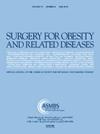在基线体重指数≥50的患者中,胆胰转流合并十二指肠转换可显著减轻体重和缓解糖尿病。
IF 3.5
3区 医学
Q1 SURGERY
引用次数: 0
摘要
背景:体重指数(BMI)≥50的患者有更多与肥胖相关的医学问题,通常需要更积极的手术治疗。很少有针对这一特定人群的单机构比较研究发表。目的:本研究旨在比较袖胃切除术(SG)、Roux-en-Y胃旁路术(RYGB)和十二指肠开关胆胰分流术(BPD/DS)的减肥和糖尿病缓解效果。环境:农村三级学术医疗中心。方法:采用前瞻性收集的资料进行回顾性队列研究。所有BMI≥50的患者均接受了SG、RYGB和BPD/DS。对并发症、再入院率、体重减轻和糖尿病缓解进行比较分析。结果:SG组3年体重减重40.1%,RYGB组减重54.1%,BPD/DS组减重67.4%,其中BPD/DS组减重显著优于rgb组(P < 0.001)。5年糖尿病完全缓解:SG为29%,RYGB为61%,BPD/DS为79%。BPD/DS手术时间明显延长(P < 0.001),轻微并发症发生率显著提高(P = 0.02)。结论:与RYGB和SG相比,BPD/DS获得了更好的持续体重减轻和糖尿病缓解。本文章由计算机程序翻译,如有差异,请以英文原文为准。
Biliopancreatic diversion with duodenal switch results in superior weight loss and diabetes remission in patients with baseline body mass index ≥50
Background
Patients with body mass index (BMI) ≥50 have more obesity-associated medical problems and often require more aggressive surgical management. Few single-institution comparative studies have been published examining this specific population.
Objectives
The study aims to compare the weight loss and diabetes remission effects of sleeve gastrectomy (SG), Roux-en-Y gastric bypass (RYGB), and biliopancreatic diversion with duodenal switch (BPD/DS).
Setting
Rural academic tertiary care center.
Methods
We conducted a retrospective cohort study using prospectively collected data. All patients with a BMI ≥50 who underwent an SG, RYGB, and BPD/DS were included. Comparative analysis was performed for complications, readmission rates, weight loss, and diabetes remission.
Results
Excess weight loss at 3 years was 40.1% for SG, 54.1% for RYGB, and 67.4% for BPD/DS, with BPD/DS performing significantly better (P < .001). Complete diabetes remission at 5 years was 29% for SG, 61% for RYGB, and 79% for BPD/DS. BPD/DS had significantly longer operative times (P < .001) and rates of minor complications (P = .02).
Conclusions
BPD/DS achieved superior sustained weight loss and diabetes remission compared with RYGB and SG.
求助全文
通过发布文献求助,成功后即可免费获取论文全文。
去求助
来源期刊
CiteScore
6.70
自引率
12.90%
发文量
570
审稿时长
56 days
期刊介绍:
Surgery for Obesity and Related Diseases (SOARD), The Official Journal of the American Society for Metabolic and Bariatric Surgery (ASMBS) and the Brazilian Society for Bariatric Surgery, is an international journal devoted to the publication of peer-reviewed manuscripts of the highest quality with objective data regarding techniques for the treatment of severe obesity. Articles document the effects of surgically induced weight loss on obesity physiological, psychiatric and social co-morbidities.

 求助内容:
求助内容: 应助结果提醒方式:
应助结果提醒方式:


